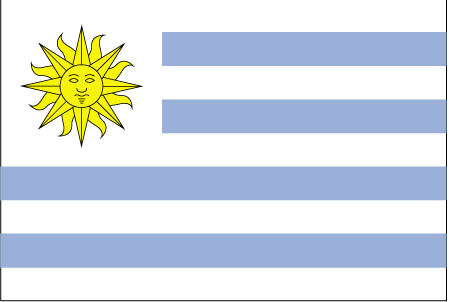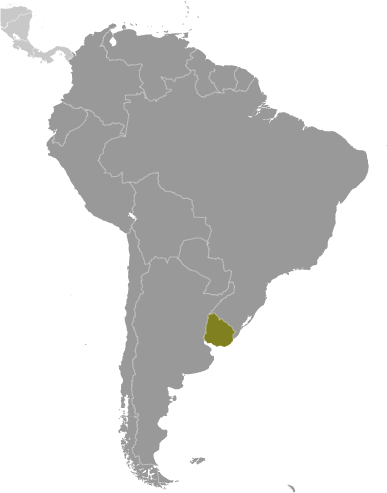Montevideo, founded by the Spanish in 1726 as a military stronghold, soon took advantage of its natural harbor to become an important commercial center. Claimed by Argentina but annexed by Brazil in 1821, Uruguay declared its independence four years later and secured its freedom in 1828 after a three-year struggle. The administrations of President Jose BATLLE in the early 20th century established widespread political, social, and economic reforms that established a statist tradition. A violent Marxist urban guerrilla movement named the Tupamaros, launched in the late 1960s, led Uruguay's president to cede control of the government to the military in 1973. By yearend, the rebels had been crushed, but the military continued to expand its hold over the government. Civilian rule was not restored until 1985. In 2004, the left-of-center Frente Amplio Coalition won national elections that effectively ended 170 years of political control previously held by the Colorado and Blanco parties. Uruguay's political and labor conditions are among the freest on the continent.
Country Name
Conventional long form:Oriental Republic of Uruguay
Conventional short form:Uruguay
Local long form:Republica Oriental del Uruguay
Local short form:Uruguay
Former:Banda Oriental, Cisplatine Province
Government Type
constitutional republic
Capital
Name:Montevideo
Geographic coordinates:34 53 S, 56 11 W
Time difference:UTC-3 (2 hours ahead of Washington, DC during Standard Time)
daylight saving time: +1hr, begins first Sunday in October; ends second Sunday in March
Administrative divisions
19 departments (departamentos, singular - departamento); Artigas, Canelones, Cerro Largo, Colonia, Durazno, Flores, Florida, Lavalleja, Maldonado, Montevideo, Paysandu, Rio Negro, Rivera, Rocha, Salto, San Jose, Soriano, Tacuarembo, Treinta y Tres
Independence
25 August 1825 (from Brazil)
National Holiday
Independence Day, 25 August (1825)
Constitution
27 November 1966; effective 15 February 1967; suspended 27 June 1973; revised 26 November 1989 and 7 January 1997
Legal system
based on Spanish civil law system; accepts compulsory ICJ jurisdiction
Suffrage
18 years of age; universal and compulsory
Executive branch
Chief of state:President Jose "Pepe" MUJICA Cordano (since 1 March 2010); Vice President Danilo ASTORI Saragoza (since 1 March 2010); note - the president is both the chief of state and head of government
Head of government:President Jose "Pepe" MUJICA Cordano (since 1 March 2010); Vice President Danilo ASTORI Saragoza (since 1 March 2010)
Cabinet:Council of Ministers appointed by the president with parliamentary approval
(For more information visit the World Leaders website)
Elections:president and vice president elected on the same ticket by popular vote for five-year terms (may not serve consecutive terms); election last held on 29 November 2009 (next to be held in October 2014)
Election results:Jose "Pepe" MUJICA elected president; percent of vote - Jose "Pepe" MUJICA 54.8%, Luis Alberto LACALLE 45.2%
Legislative branch
bicameral General Assembly or Asamblea General consists of Chamber of Senators or Camara de Senadores (30 seats; members elected by popular vote to serve five-year terms; vice president has one vote in the Senate) and Chamber of Representatives or Camara de Representantes (99 seats; members elected by popular vote to serve five-year terms)
Elections:Chamber of Senators - last held on 25 October 2009 (next to be held in October 2014); Chamber of Representatives - last held on 25 October 2009 (next to be held in October 2014)
Election results:Chamber of Senators - percent of vote by party - NA; seats by party - Frente Amplio 16, Blanco 9, Colorado Party 5; Chamber of Representatives - percent of vote by party - NA; seats by party - Frente Amplio 50, Blanco 30, Colorado Party 17, Independent Party 2
Judicial branch
Supreme Court (judges are nominated by the president and elected for 10-year terms by the General Assembly)
Political Parties and Leaders
Broad Front (Frente Amplio) - formerly known as the Progressive Encounter/Broad Front Coalition or EP-FA [Jorge BROVETTO] (a broad governing coalition that includes Movement of the Popular Participation or MPP, New Space Party (Nuevo Espacio) [Rafael MICHELINI], Progressive Alliance (Alianza Progresista) [Rodolfo NIN NOVOA], Socialist Party [Eduardo FERNANDEZ], Communist Party [Marina ARISMENDI], Uruguayan Assembly (Asamblea Uruguay) [Danilo ASTORI], and Vertiente Artiguista [Mariano ARANA]); Colorado Party (Foro Batllista) [Julio Maria SANGUINETTI]; National Party or Blanco [Luis Alberto LACALLE and Jorge LARRANAGA]
Political pressure groups and leaders
Architect's Society of Uruguay (professional organization); Chamber of Uruguayan Industries (manufacturer's association); Chemist and Pharmaceutical Association (professional organization); PIT/CNT (powerful federation of Uruguayan Unions - umbrella labor organization); Rural Association of Uruguay (rancher's association); Uruguayan Construction League; Uruguayan Network of Political Women
Other:Catholic Church; students
International organization participation
CAN (associate), FAO, G-77, IADB, IAEA, IBRD, ICAO, ICC, ICCt, ICRM, IDA, IFAD, IFC, IFRCS, IHO, ILO, IMF, IMO, Interpol, IOC, IOM, IPU, ISO, ITSO, ITU, LAES, LAIA, Mercosur, MIGA, MINURSO, MINUSTAH, MONUC, NAM (observer), OAS, OPANAL, OPCW, PCA, RG, UN, UNASUR, UNCTAD, UNESCO, UNIDO, Union Latina, UNMOGIP, UNOCI, UNWTO, UPU, WCO, WFTU, WHO, WIPO, WMO, WTO
Diplomatic representation in the US
Chief of mission:Ambassador Carlos Alberto GIANELLI Derois
Chancery:1913 I Street NW, Washington, DC 20006
Telephone:[1] (202) 331-1313 through 1316
FAX:[1] (202) 331-8142
Consulate(s) general:Chicago, Los Angeles, Miami, New York
consulate(s): San Juan (Puerto Rico)
Diplomatic representation from the US
Chief of mission:Ambassador David NELSON
Embassy:Lauro Muller 1776, Montevideo 11200
Mailing address:APO AA 34035
Telephone:[598] (2) 418-7777
FAX:[598] (2) 418-8611
Flag description
nine equal horizontal stripes of white (top and bottom) alternating with blue; a white square in the upper hoist-side corner with a yellow sun bearing a human face known as the Sun of May with 16 rays that alternate between triangular and wavy; the stripes represent the nine original departments of Uruguay; the sun symbol evokes the legend of the sun breaking through the clouds on 25 May 1810 as independence was first declared from Spain (Uruguay subsequently won its independence from Brazil)
note: the banner was inspired by the national colors of Argentina and by the design of the US flag










